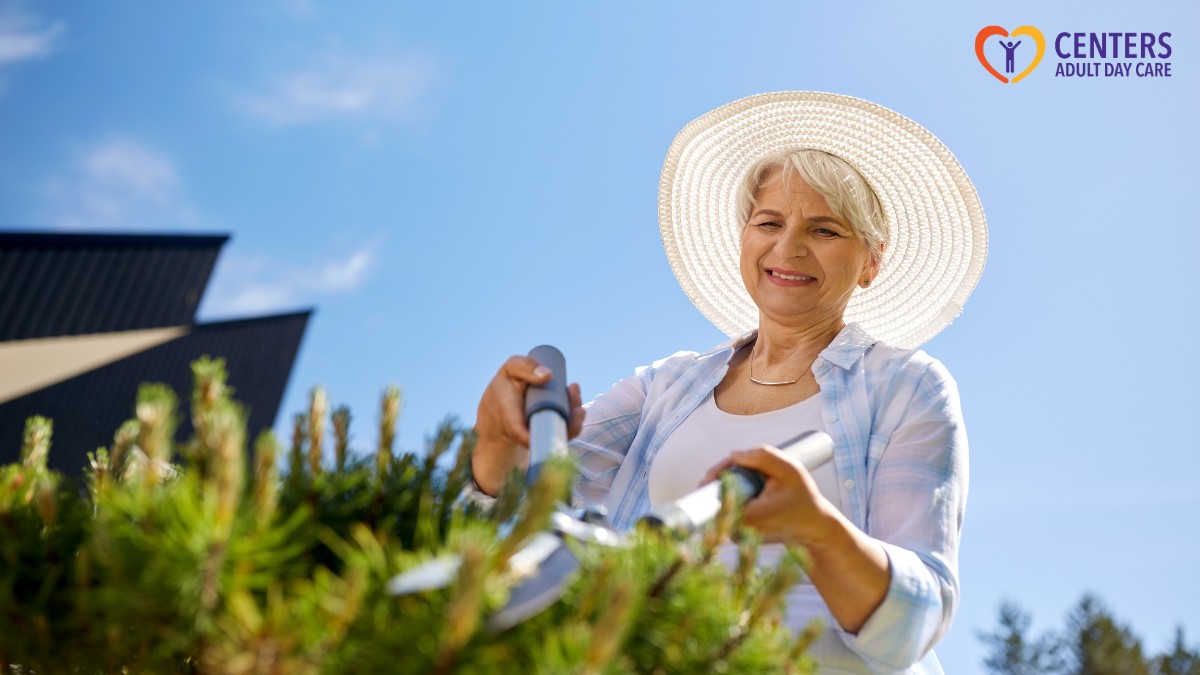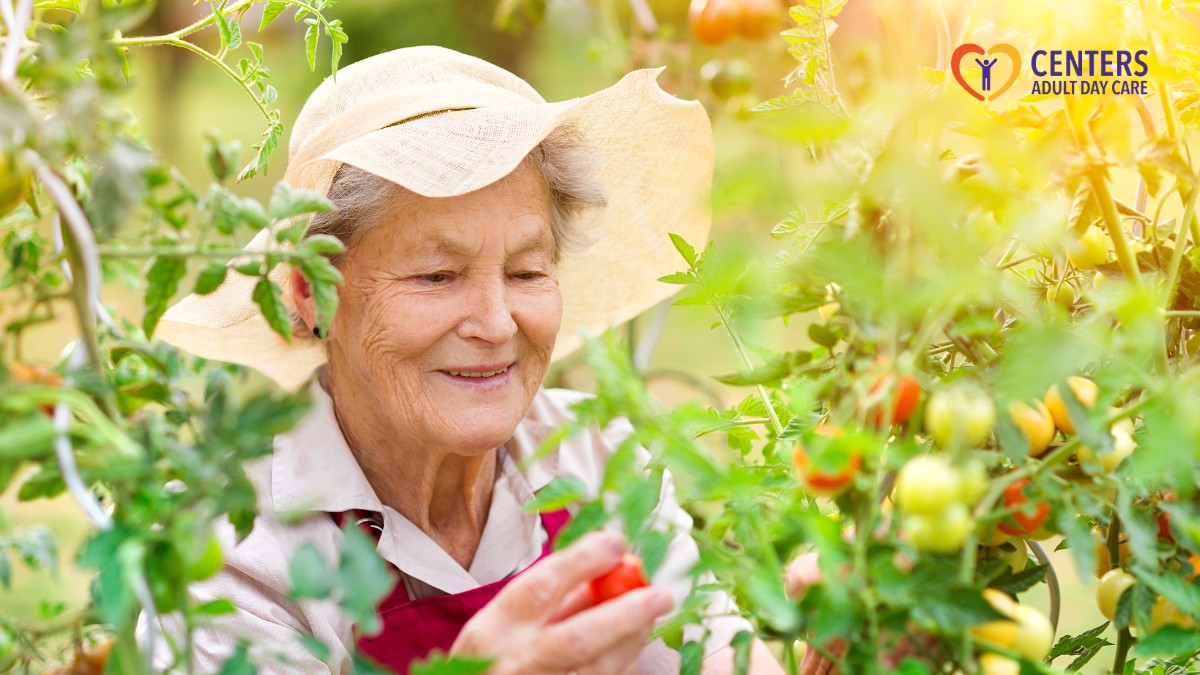Key Points:
- Gardening therapy improves mental, physical, and emotional health for seniors in adult daycare.
- Engaging with plants boosts memory, reduces stress, and supports mobility and strength.
- Adult daycare programs that include horticultural therapy foster connection, purpose, and calm for older adults.
There’s something deeply comforting about tending to a garden—feeling the soil, watching a plant grow, breathing in fresh air. For many senior family members, gardening stirs memories of past routines and offers a chance to reconnect with nature and themselves. It’s more than a hobby—it’s healing.
What Is Gardening Therapy?
Gardening therapy, also known as horticultural therapy, is the use of garden-based activities as a structured part of care and wellness programs. It’s increasingly found in adult daycare centers, where seniors can engage with plants in a way that promotes both enjoyment and therapeutic benefits.
Whether planting herbs in raised beds, potting flowers, or watering vegetables, gardening gives seniors purpose, sensory engagement, and gentle movement—all in a calming environment.
For older adults who may no longer maintain a home garden, this kind of activity restores a meaningful routine, encourages interaction, and supports overall well-being.

Why Gardening Therapy Works for Seniors
Gardening therapy is effective because it engages multiple systems of the body at once—physical, cognitive, emotional, and social. That’s especially important for seniors, who often face challenges in one or more of these areas.
Let’s break down how gardening benefits seniors in adult daycare programs.
1. Improves Physical Health
Gardening may not seem like a physical exercise, but even simple movements like digging, planting, reaching, or pulling weeds require strength, balance, and coordination.
For seniors, this kind of gentle physical activity can:
- Increase flexibility and joint strength
- Support hand-eye coordination
- Improve circulation
- Reduce stiffness from arthritis
- Enhance balance, lowering fall risk
In adult daycare settings, staff can modify gardening tools or use raised beds to ensure seniors with limited mobility or strength can participate safely.
2. Boosts Mental and Cognitive Function
Horticultural therapy has been shown to support cognitive health, particularly for seniors with early dementia or Alzheimer’s.
Gardening engages memory and decision-making—choosing where to plant, remembering to water, or recognizing different plant types. These small actions stimulate brain activity and can help:
- Slow cognitive decline
- Strengthen focus and attention
- Improve short-term memory
- Encourage problem-solving skills
Even passive participation, such as watching plants grow or smelling herbs, can awaken memory and reduce agitation in those with memory loss.
3. Reduces Stress and Anxiety
Spending time in a garden naturally calms the nervous system. Exposure to green spaces is associated with lower cortisol levels (the stress hormone) and improved mood.
In adult daycare settings, gardening areas often serve as peaceful retreats for seniors who feel overstimulated or anxious. Engaging with nature helps:
- Lower blood pressure
- Reduce depression
- Ease anxiety and restlessness
- Promote relaxation and mindfulness
For seniors dealing with life transitions or chronic illness, having a space where they can just “be” with nature offers deep emotional relief.
4. Fosters a Sense of Purpose and Achievement
As people age, they often lose roles that once defined them—worker, caregiver, homemaker. Gardening offers a chance to create, nurture, and contribute again.
When a senior plants a flower or waters a vegetable and watches it grow, there’s an immediate sense of purpose and visible accomplishment. This builds self-esteem and encourages motivation.
In adult daycare, even small tasks like labeling seed trays or arranging cut flowers give participants a reason to be proud and stay engaged.
5. Encourages Social Interaction
Gardening is often a group activity, even if tasks are individual. Conversations flow easily while planting or harvesting. Participants swap tips, share stories, or admire each other’s work.
For seniors at risk of social isolation, this connection is vital. Adult daycare gardening programs may include:
- Group planting days
- Garden-themed crafts
- Harvest celebrations or cooking with homegrown produce
- Nature walks or outdoor reflection
These shared experiences strengthen bonds and reduce feelings of loneliness.
How Adult Daycare Programs Integrate Gardening
Not every adult daycare program includes a full garden, but many offer creative ways to bring horticultural therapy into their daily routines.
Common features include:
- Raised garden beds to allow access for wheelchair users or those with limited mobility
- Indoor gardening projects like windowsill herb pots or terrariums
- Sensory gardens designed with fragrant, colorful, and textured plants
- Therapeutic horticulture sessions led by trained facilitators
- Themed garden clubs that meet regularly to plan, plant, and care for crops
Staff are trained to adapt gardening activities based on each participant’s physical and cognitive ability. This ensures everyone can safely take part, regardless of health status.
Tips for Making Gardening Safe and Accessible
Adult daycare programs take special care to make gardening therapy not only enjoyable but also safe for seniors. If you’re helping a loved one explore this option, here are a few ways programs adapt the activity:
- Use ergonomic tools with larger grips
- Ensure shaded outdoor areas to prevent overheating
- Provide seating options so seniors can garden while sitting
- Choose low-maintenance plants that don’t require frequent bending or pruning
- Incorporate raised beds or vertical gardens to reduce strain
Many adult daycare centers also include time for reflection after gardening—whether through group discussion, journaling, or simply relaxing in the garden space.

When Is Gardening Therapy Most Beneficial?
Gardening therapy can be introduced at any stage of senior care, but it’s particularly valuable in the following situations:
- A senior shows signs of depression or withdrawal
- There is early-stage dementia, and routines need to include structured engagement
- Physical therapy goals include improving strength or coordination
- A loved one has recently transitioned to adult daycare and needs to feel purposeful
By weaving gardening into the weekly rhythm of care, adult daycare centers help participants develop habits that nurture both the mind and body.
Experience the Power of Nature Through Adult Day Care in New York
Interested in giving your loved one the joy of gardening therapy in a safe, supportive setting? Centers Adult Day Care provides enriching, hands-on experiences that include therapeutic gardening as part of a well-rounded day program.
If you’re exploring trusted adult day care in New York, our centers offer nature-based activities designed to uplift seniors physically, mentally, and emotionally. With caring staff, thoughtful programming, and a focus on meaningful engagement, we help seniors thrive one garden at a time.
Reach out today to learn how your loved one can benefit from the healing rhythm of gardening through our adult daycare programs.


